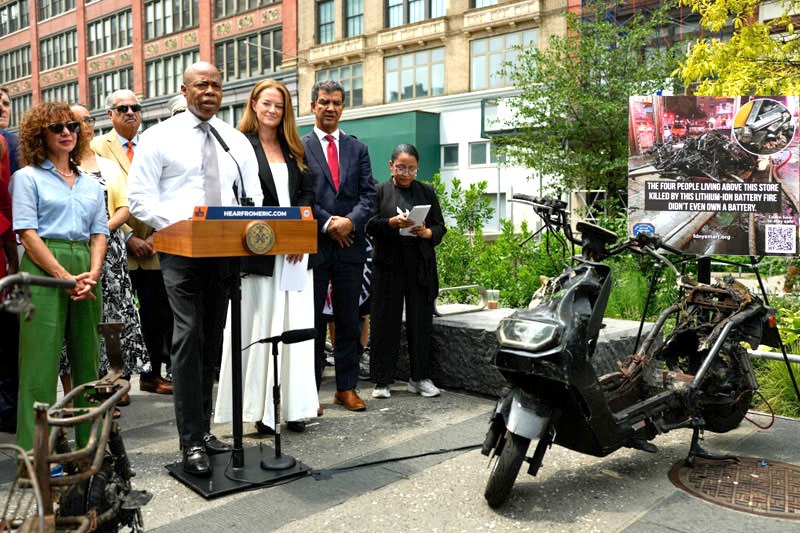July 26, 2024 - (New York City, NY) New York City Mayor Eric Adams launched the New York City Safe Charging Accelerator on July 22 to ensure safe e-bike usage and charging, and to prevent deadly lithium-ion battery fires in New York City. As a part of this accelerator, the New York City Department of Transportation (DOT) will propose a rule to expedite approvals for property owners to more quickly install e-bike battery swapping and charging cabinets on public sidewalks, removing barriers to their installation and making them accessible and usable for e-bike users.

Additionally, DOT will launch the nation’s first municipal trade-in pilot program for unsafe e-bikes and other powered mobility devices and their batteries, allowing eligible food delivery workers to replace their unsafe devices with certified, high-quality e-bikes and batteries. Finally, the Fire Department of the City of New York (FDNY) will launch a $1 million public education and awareness campaign on the dangers of unsafe lithium-ion batteries, following new data showing that 59 percent of 2023’s lithium-ion battery fires started when those batteries were not charging. These steps build on Mayor Adams’ “Charge Safe, Ride Safe: New York City’s Electric Micromobility Action Plan” to promote public safety as e-bike usage continues to skyrocket.
“When used correctly, e-bikes are a convenient, low-cost transportation option that reduce congestion and emissions, and tens of thousands of delivery workers rely on them every day,” said Mayor Adams. “But too often, those bikes are powered by unsafe, uncertified batteries that at any minute could combust. That is why we are doing everything in our power to put a stop to these deadly fires and make use of safe lithium-ion batteries more affordable. We’re cutting red tape so property owners can install charging stations outside, in front of their buildings. We’re also launching the nation’s first municipal trade-in program, so delivery workers can swap their dangerous bikes and batteries for certified, safe versions. And we’re launching a new campaign to let New Yorkers know that charging or not, uncertified batteries can be ticking time bombs. When New Yorkers face danger, this administration will take decisive action, and that is what we have done and continue to do with respect to deadly lithium-ion battery fires.”
“The Adams administration knows e-micromobility is a critical tool many New Yorkers use for work, commuting, and pleasure, and we want to ensure our residents have more access to new technology and guidance that allows them to charge and store their lithium-ion batteries safely and prevent dangerous fires,” said Chief of Staff Camille Joseph Varlack. “I am proud New York City and the mayor’s E-Micromobility Interagency Task Force is leading the way on this urgent issue.”
“We must deliver safety to the people who deliver everything we want to our doorstep every day. That’s why we’re making sure that safe charging and storage equipment can be on our streets, where on-demand delivery workers need it; that e-bike safety education is widespread and easy to access; and delivery workers have the chance to swap a dangerous bike and battery for a new one,” said Deputy Mayor for Operations Meera Joshi. “In addition to these critical fire safety measures, we are hard at work with our partners in the City Council to create regulatory authority to more broadly control who uses our streets for profit and how.”
“The fact of the matter is that deaths caused by lithium-ion battery fires are preventable,” said Deputy Mayor for Public Safety Philip Banks III. “We should not be losing any lives to this, and these efforts will go a long, long way toward getting us to that goal of zero. We’ve already made progress thanks to New Yorkers heeding the warnings about these devices, and we’re going to continue to give them the tools and support they need to stay safe.”
“E-bikes are critical tools used by tens of thousands of delivery workers to support our economy,” said DOT Commissioner Ydanis Rodriguez. “By providing these workers with reliable, safe equipment, we are helping protect this workforce, their neighbors and loved ones, and all New Yorkers who rely on them each day. We look forward to engaging with delivery stakeholders and with the broader public as we work together to make our city safer for everyone.”
“The reality is that lithium-ion batteries can be dangerous even if they are certified, and even if they are not charging,” said FDNY Commissioner Laura Kavanagh. “We implore every user of a device with a lithium-ion battery to closely review this campaign and see for yourselves the deadly and destructive fires the device in your home may cause. We are not kidding around, and need everyone to think about their safety, and the safety of their families, their neighbors, and first responders.”
“Thanks to the Adams administration’s efforts, New York continues to be the safest big city in the country, and, with the launch of the new Safe Charging Accelerator, we are continuing to be a national leader in the field of building safety,” said New York City Department of Buildings (DOB) Commissioner James Oddo. “Through the Accelerator, DOB is working in close coordination with our partner agencies on a streamlined approval process for property owners who are looking to safely install new sidewalk charging cabinets outside of their buildings. The dangers associated with poorly manufactured lithium-ion batteries are clear, and by taking these batteries out of people’s homes, these sidewalk charging cabinets will vastly improve the safety of our built environment.”
“Uncertified lithium-ion batteries pose immense danger for our neighbors and communities, and we’re proud to stand with our sister agencies in taking bold action to keep New Yorkers safe,” said New York City Department of Consumer and Worker Protection Commissioner Vilda Vera Mayuga. “Delivery workers, like all workers, deserve safe equipment to perform their jobs and we thank the mayor and Commissioner Rodriguez for delivering for them by establishing this first-of-its-kind program to provide safer devices for some of our city’s hardest workers.”
Illegal and unregulated batteries — which power tens of thousands of micromobility devices in New York City — pose significant risks to residents and first responders due to their potential for explosive and deadly fires. Since 2019, lithium-ion batteries have started 733 fires, killing 29 New Yorkers and injuring 442 more. Notably, in 2023, 133 fires started from lithium-ion batteries that were not charging, compared to 91 that occurred while they were.
Simplifying Safe E-Bike Charger Installation
To address fire safety concerns and promote the safe use of electric micromobility devices, DOT is proposing a rule to expedite approvals for property owners to install electric micromobility device battery swapping and charging cabinets on public sidewalks, which is currently prohibited. This rule will enable property owners, or commercial tenants with the property owner’s consent, to apply for a permit to install a battery swapping and charging cabinet in front of their business on the sidewalk. Each cabinet must comply with specific siting and dimensional requirements and undergo FDNY and DOB review and approval.
To support this effort, the FDNY will hire additional staff to allow for expedited safety inspections and approvals of equipment for use in New York City. Once fully staffed, approval decisions are anticipated to take no more than six weeks, with prioritized approvals for new technologies. The city will publish clear guidance for building owners on how to improve charging safety in their buildings.The FDNY will also update its website to make it easier for companies that sell lithium-ion battery storage and swapping cabinets to receive FDNY approval. To provide further guidance on lithium-ion battery policies, the city will convene a working group consisting of representatives from tech companies, real estate stakeholders, and municipal experts focused on transportation and fire safety. Within 90 days of convening, that group will issue a set of recommendations on how to update city rules and processes to increase adoption of safe charging cabinets.
A public hearing on the administration’s battery swapping and charging cabinets rule will be held online on August 21 at 10:00 AM. Applications for the program will open at the end of 2024.
E-Micromobility Trade-in Program for Food Delivery Workers
Currently, many food delivery workers utilize uncertified e-bikes and heavier electric and gas-powered mopeds, which cannot be registered with the New York state Department of Motor Vehicles due to the lack of Vehicle Identification Numbers. DOT’s e-bike trade-in program — the nation’s first municipal program of its kind — will focus on exchanging unsafe e-bikes and lithium-ion batteries for new devices. Selected participants will receive a UL-certified e-bike and two compatible, UL-certified batteries in exchange for their unsafe devices and batteries. By swapping these illegal devices for UL-certified e-bikes and batteries, the program will reduce fire and crash risks; help participants comply with local and state laws; and encourage workers to utilize cleaner, greener, forms of e-mobility for deliveries.
The program offers trade-ins of both e-micromobility devices and lithium-ion batteries to help ensure that unsafe batteries and devices are fully removed from New York City streets and that batteries are compatible with the devices they are powering. Participants must reside in New York City, be at least 18 years of age, own an eligible, working device, and have earned at least $1,500 over the prior year as a food delivery worker to be eligible to participate in the program. Participants will receive two batteries because many delivery workers report that a full day of work often necessitates the use of two batteries.
A public hearing on the administration’s new trade-in program will be held online on August 22 at 10:00 AM. Applications for the program will open at in early 2025. The e-bike and battery trade-ins will take place in 2025, using $2 million in funding.
FDNY Public Education Campaign
This month, FDNY will launch a $1 million education campaign to further raise public awareness about the historic increase in lithium-ion battery fires in New York City and the dangers that uncertified batteries pose — even when they are not charging. Batteries must be safety certified by a national, accredited testing laboratory, like UL, and should never be repaired but rather replaced. A devastating fire that took place in May 2024 was caused by a battery on a moped that had not been used or charged in two years. In 2023, lithium-ion battery fires killed 18 people, making those fires among the top causes of fire fatalities.
Of the $1 million, $750,000 will be used for ads online, on subways and buses, on digital kiosks, in targeted newspapers, and on the radio. Translated into 10 languages, these ads will highlight the destructive potential of battery fires and will be strategically placed in neighborhoods that have a high incidence of lithium-ion battery fires. Ads will feature imagery promoting proper battery usage and include QR codes linked to fire safety education tips, including best practices for usage; will include input and safety messaging from agency partners citywide; and will incorporate feedback from delivery workers. The final $250,000 will support educational materials and advanced firefighting equipment, including technology that allows firefighters to safely extinguish fires without opening lithium-ion battery packs. New Yorkers can learn more about lithium-ion batteries and view the new campaign online.
The Adams administration has taken swift and urgent action to prevent dangerous lithium-ion battery fires and promote safe e-bike usage and charging as more and more New Yorkers use e-micromobility devices to get around the five boroughs for both work and for leisure. In March 2023, Mayor Adams released “Charge Safe, Ride Safe: New York City’s Electric Micromobility Action Plan.” The plan focuses on four key areas: promoting and incentivizing safe battery use, increasing education and outreach to electric micromobility users, advocating for additional federal regulation of these devices, and expanding enforcement against high-risk situations. Last spring, Mayor Adams also signed five bills into law to further regulate lithium-ion batteries sold in New York City and strengthen fire safety related to battery fires.
Additionally, in his 2024 State of the City address, Mayor Adams proposed the creation of the New York City Department of Sustainable Delivery — a first-in-the-nation regulatory entity that will establish clear goals and guidelines for the future of delivery in New York City; consolidate work that is now spread out over multiple agencies; prioritize safety; and harness the potential of e-bikes, mopeds, cargo bikes, and other e-micromobility devices. Efforts to structure this new entity are ongoing.
Subsequently, in February, Mayor Adams activated the first of five public e-battery charging stations as part of the city’s new six-month pilot program to test safe, public charging of lithium-ion batteries by an initial group of 100 delivery workers.
The Adams administration has also worked closely with delivery app companies, as well as delivery workers, to spread fire safety messaging among groups and business organizations most likely to utilize e-micromobility devices. In June, the city hosted “Pedal Power for the Green Economy” at the Brooklyn Army Terminal, where government, advocacy, and economic development stakeholders convened to test out electric micromobility devices and charging cabinets and discuss ways businesses and government can collaborate to build the green workforce of the future in New York City
Finally, FDNY Commissioner Kavanagh has visited Washington, D.C. four times in the past two years to advocate for legislative changes to promote lithium-ion battery safety. On her latest trip, she met with bipartisan lawmakers, attended the inaugural World Fire Congress, and participated in a panel with global fire experts to discuss lithium-ion battery safety. FDNY Commissioner Kavanagh also testified before the U. S. Consumer Product Safety Commission (CPSC) in July 2023. Subsequently, the U.S. House of Representatives passed H.R. 1797, the “Setting Consumer Standards for Lithium-Ion Batteries Act,” which mandates that the CPSC establishes safety standards for rechargeable lithium-ion batteries in devices like e-bikes and e-scooters to prevent fire risks. That bill is expected to be voted on by the U.S. Senate by the end of the year.
The Lithium-Ion Battery Task Force — made up of FDNY fire marshals, Bureau of Fire Prevention inspectors, and DCWP inspectors — have conducted hundreds of inspections at e-bike and e-bike repair shops throughout the city. More than 1,000 violations, 46 criminal summonses, and 16 vacate orders were issued last year alone. The enactment of Local Laws 39 and 40, which make uncertified lithium-ion batteries illegal, has led to increased enforcement efforts and fewer of these dangerous devices being utilized on New York City streets. FDNY has also produced multiple Public Safety Awareness ads on both digital and television platforms. FDNY Fire Safety Education teams conduct events throughout the city every day, highlighting best practices for lithium-ion battery use. The full list of FDNY’s fire safety tips can be found online.
“Today is a historic step forward in our quest to rid New York City of e-bike battery fires,” said New York State Assemblymember Jenifer Rajkumar. “Last year, there were 268 lithium-ion battery fires in our city, taking the lives of 18 people. To stamp out this scourge of deadly fires, I helped pass the bill in Albany to ban the sale of uncertified batteries, which was just signed into law. I am now proud to support Mayor Adams as he takes the lead rolling out outdoor charging infrastructure, a trade-in program to take dangerous reconditioned batteries out of circulation, and an FDNY educational campaign. To build on this tremendous progress, I authored Priscilla’s Law, my bill in Albany which will require e-bike license plates, registration, and battery inspection. Together, we will make battery fires history and support the future of micromobility.”
“We have seen the devastating and tragic impact of e-battery fires in New York City. E-devices are a convenient, eco-friendly mode of transportation that commuters and workers rely upon, and encouraging outdoor charging and getting unsafe devices off the street will be critical to keeping New Yorkers safe,” said Manhattan Borough President Mark Levine. “I’m grateful to the Mayor, DOT, and FDNY for prioritizing New Yorkers’ safety with these creative solutions for e-bikes.”
“Lithium-ion batteries have proliferated all over the city, especially in e-bikes,” said Staten Island Borough President Vito Fossella. They can pose a dangerous fire hazard, as just this year alone, there have been over 250 lithium-ion battery fires in the city, including one just last week in Port Richmond. We thank Mayor Adams for responding to our concerns with this action to take unsafe e-bikes off our streets, educate bikers on proper storage, charging and operation, and improve overall safety.”
“We’ve lost far too many neighbors here in Queens and across the five boroughs in recent years to devastating, yet preventable fires caused by lithium-ion batteries,” said Queens Borough President Donovan Richards Jr. “I thank the administration for putting forth these serious, life-saving efforts to prevent future tragedies — from allowing property owners to more easily install outdoor battery charging stations to promoting education around battery-caused blazes — and I look forward to working together to keep New Yorkers safe.”
“It’s critical that we continue to take steps to get dangerous, fire-starting lithium-ion batteries out of New York City,” said New York City Councilmember Keith Powers. “That’s why I introduced the bill that became Local Law 131 of 2023 to create the first municipal battery trade-in program in the country. I am grateful that Mayor Adams’ administration, the Fire Department, and the Department of Transportation are doing this important work to make us safer.”
“In 2023, e-bike battery fires resulted in 268 incidents, causing 150 injuries and 18 deaths,” said New York City Councilmember Julie Menin. “We urgently must address this critical safety issue affecting numerous communities across New York City. The implementation of the new trade-in program and the launch of a public awareness campaign are important steps towards mitigating this persistent problem and enhancing public safety.”
“As Chair of the NYC Council Committee on Fire and Emergency Management, I know all too well that lithium-ion battery related fires have claimed far too many lives in this city,” said New York City Councilmember Joann Ariola. “These new actions will go a long way towards protecting the people of New York City from these otherwise preventable tragedies. I commend the mayor, the FDNY, the DOT, and everyone else who was involved in this. Together we can make a safer city for everyone.”
“Safe lithium-ion battery charging is essential for reducing the risk of fires as we see continued growth in delivery work and sustainable transportation made possible by e-bikes and other lithium-ion powered devices,” said New York City Councilmember Carlina Rivera. “No one should have to choose between their safety and their paycheck. The City’s investment in e-bike charging infrastructure, trade-in programs, and outreach and education campaigns will make our city safer. I commend Commissioner Rodriguez and Commissioner Kavanagh for prioritizing the safety of delivery workers and all e-bike users.”
“Increasing access to safe e-bikes and lithium-ion battery charging not only ensures that our city’s delivery workers have the resources they need to provide their essential services, reinforcing workforce safety and continuity for a population of workers who face prevalent risks and rising costs as independent contractors,” said Ligia Guallpa, executive director, Worker’s Justice Project. “It will also help fuel the next evolution in our city’s progress toward a more sustainable and carbon-neutral future. We are grateful to Mayor Adams for demonstrating that when we think intentionally about worker safety. We can stimulate critical innovations in urban design for all.”
“The battery-fire crisis plaguing New York City is solvable, and we’re thrilled to see results showing that it can be done while improving the lives of the delivery workers who serve as the backbone of the city,” said David Hammer, co-founder, PopWheels. “We’re grateful to Mayor Adams, DOT, Newlab, and NYCEDC for their leadership and vision in helping bring these solutions to the streets as fast as possible, and we’re excited to continue getting bad batteries out of the homes of New York City.”
“We’re seeing consistent safe charging by delivery workers at our charging stations,” said Matt Tollner, director of operations, Swiftmile. “In the past few months, DOT’s pilot has boosted safety and supported the demand for sustainable transportation in New York City. Swiftmile’s charging infrastructure continues to allow delivery workers to operate more safely, leading to fewer disruptions, lower maintenance costs, and an improved quality of life for delivery workers.”
“Our collaboration with the New York City Department of Transportation and Newlab has led to exceptional outcomes, with the Cooper Square charging station achieving the highest utilization rate globally for Swobbee,” said Stephan Von Wolff, managing director, Swobbee US. “It is incredibly rewarding to see delivery riders embrace and rely on our system, demonstrating its critical importance and effectiveness.”

















